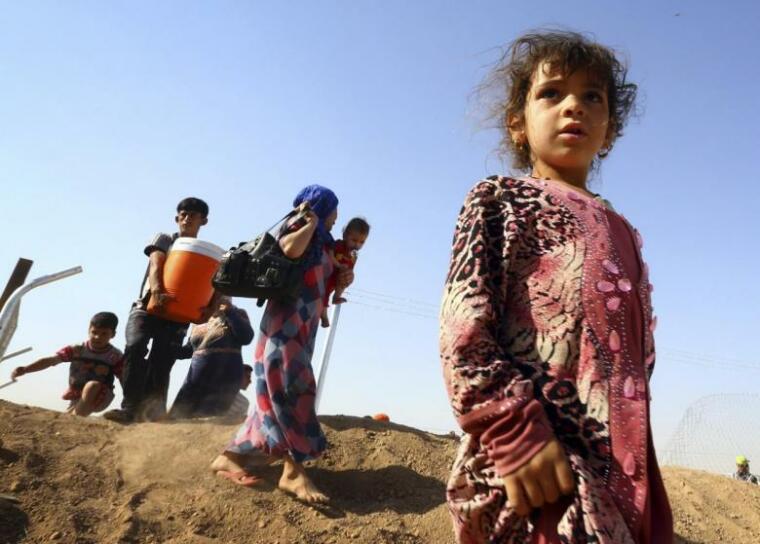Christians are being ignored in Iraq's reconstruction efforts, charities warn

A coalition of UK-based charities has warned that Christians are being excluded from reconstruction plans for northern Iraq, further diminishing the likelihood of their return once ISIS is defeated in the region.
The coalition, composed of 16 nongovernmental organizations, have produced an 88-page report highlighting how leaders of religious minorities are being excluded from the National Settlement plan being drawn up by Iraq and other regional powers and presented to the U.N.
The report added that the political and security concerns of Christians and other minorities must be addressed so that they will be convinced to return to Mosul or the surrounding Nineveh Plains to rebuild their communities.
The charities that contributed to the report include Aid to the Church in Need, the Assyrian Church of the East Relief Fund, the Syrian Network for Human Rights, Syrian Christians for Peace, the Evangelical Christian Alliance Church in Lebanon and the Alliance Church of Jordan, World Watch Monitor reported.
The report noted that Christians are not getting the support they need from international donor institutions, such as the U.N. High Commissioner for Refugees (UNHCR). They have to rely instead on churches that are running their own aid programs with limited funds.
"All the NGOs involved in this report state that the vast majority of Christians and other 'minorities' avoid UNHCR camps and facilities because of continuing discrimination and persecution," the report stated.
"It is utterly unacceptable that a place of sanctuary should be a place of fear that repels those it is designed to save and protect," it continued.
The report added that those remain outside UNHCR camps "have fared ... unequally in the allocation of international aid, funding, political support, media attention, and asylum placements."
It calls on UNHCR to abandon its "need not creed approach" and acknowledge the experiences of minorities in its camps. It also urges the organization to add more non-Muslim registration, security staff and translators in its facilities to reduce discrimination against minorities.
Last month the Iraqi parliament Speaker Salim al-Jabouri announced that the Sunni blocs in the parliament have prepared a version of the national settlement.
Yonadam Kanna, the secretary-general of the Assyrian Democratic Movement and a member of the Iraqi parliament, objected to the settlement document because it did not include any clause determining the fate of disputed minority areas disputed by the Kurds and Arabs. These areas include the Nineveh Plains for the Christians and Shabaks, Tal Afar for the Turkmens and Sinjar for the Yazidis.
"Minorities do not have a say in this and they are not even allowed to determine their own fate. The settlement does not take into account the views of Christians or Yazidis or any other less influential minority groups," he said.
Kanna has previously criticized national reconciliation projects prepared by larger political groups for failing to provide guarantees that those who have committed atrocities against religious minorities would be brought to justice.
 Christians don't have to affirm transgenderism, but they can’t express that view at work: tribunal
Christians don't have to affirm transgenderism, but they can’t express that view at work: tribunal Archaeology discovery: Medieval Christian prayer beads found on Holy Island
Archaeology discovery: Medieval Christian prayer beads found on Holy Island Presbyterian Church in America votes to leave National Association of Evangelicals
Presbyterian Church in America votes to leave National Association of Evangelicals Over 50 killed in 'vile and satanic' attack at Nigerian church on Pentecost Sunday
Over 50 killed in 'vile and satanic' attack at Nigerian church on Pentecost Sunday Ukrainian Orthodox Church severs ties with Moscow over Patriarch Kirill's support for Putin's war
Ukrainian Orthodox Church severs ties with Moscow over Patriarch Kirill's support for Putin's war Islamic State kills 20 Nigerian Christians as revenge for US airstrike
Islamic State kills 20 Nigerian Christians as revenge for US airstrike Man who served 33 years in prison for murder leads inmates to Christ
Man who served 33 years in prison for murder leads inmates to Christ


 Nigerian student beaten to death, body burned over ‘blasphemous’ WhatsApp message
Nigerian student beaten to death, body burned over ‘blasphemous’ WhatsApp message 'A new low': World reacts after Hong Kong arrests 90-year-old Cardinal Joseph Zen
'A new low': World reacts after Hong Kong arrests 90-year-old Cardinal Joseph Zen Iran sentences Christian man to 10 years in prison for hosting house church worship gathering
Iran sentences Christian man to 10 years in prison for hosting house church worship gathering French Guyana: Pastor shot dead, church set on fire after meeting delegation of Evangelicals
French Guyana: Pastor shot dead, church set on fire after meeting delegation of Evangelicals ‘Talking Jesus’ report finds only 6% of UK adults identify as practicing Christians
‘Talking Jesus’ report finds only 6% of UK adults identify as practicing Christians Mission Eurasia ministry center blown up in Ukraine, hundreds of Bibles destroyed: 'God will provide'
Mission Eurasia ministry center blown up in Ukraine, hundreds of Bibles destroyed: 'God will provide' Church holds service for first time after ISIS desecrated it 8 years ago
Church holds service for first time after ISIS desecrated it 8 years ago Burger King apologizes for 'offensive campaign' using Jesus' words at the Last Supper
Burger King apologizes for 'offensive campaign' using Jesus' words at the Last Supper Uganda: Muslims abduct teacher, burn him inside mosque for praying in Christ’s name
Uganda: Muslims abduct teacher, burn him inside mosque for praying in Christ’s name